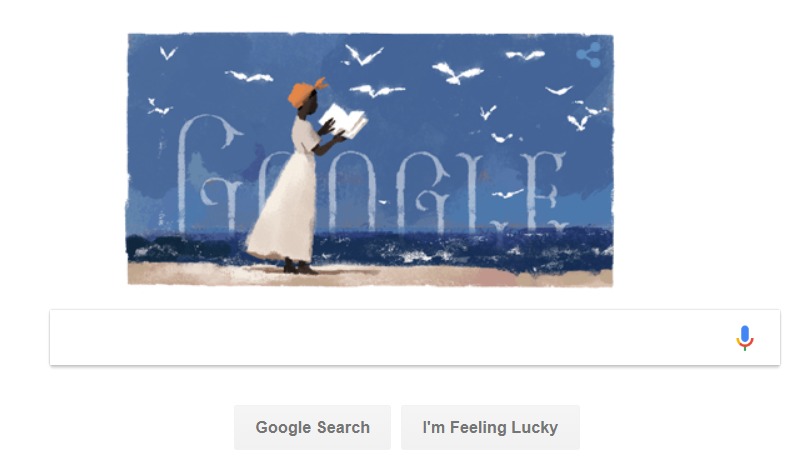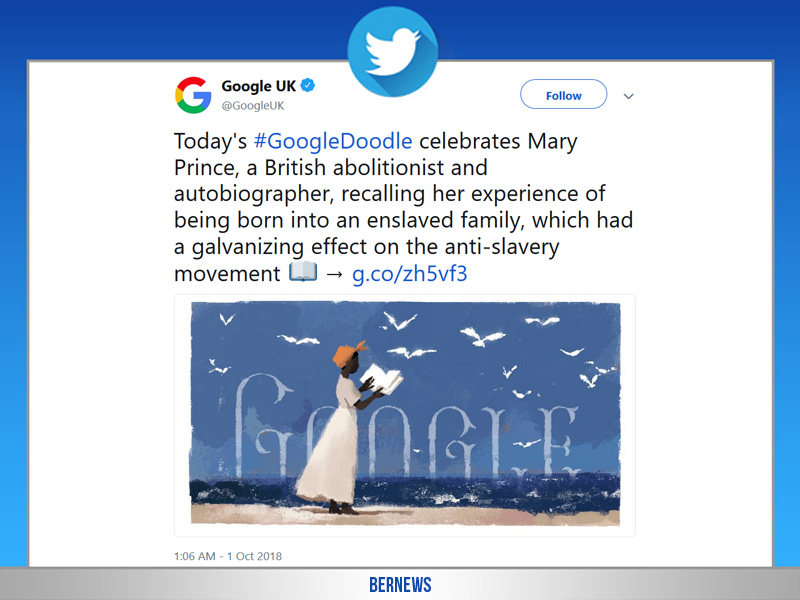Google Doodle Pays Tribute To Mary Prince
Search engine giant Google has paid tribute to Bermudian Mary Prince today, with their homepage ‘Google Doodle’ marking her 230th birthday, and serving to recognize her work to help abolish slavery.
In announcing her as a Bermuda National Hero back in 2012, the Government noted that she was first black woman to publish a book about the brutality of slavery, with Ms Prince’s book ‘The History of Mary Prince’ — published in 1831 — considered to be extremely significant because it was “instrumental in helping to dismantle slavery in Bermuda and the Caribbean.”
“According to biographical records, it was the first account of the life of a black woman to be published in the UK. A first-hand description of the brutalities of enslavement, released at a time when slavery was still legal in the British Caribbean colonies and Bermuda, it had a galvanising effect on the anti-slavery movement. ”
A ‘Google Doodle’ is a temporary change made to the Google logo to celebrate holidays, anniversaries, and the lives of famous artists, pioneers, and scientists; and being featured as a Doodle is highly prestigious. According Google’s website, the ‘Doodle’s Reach’ spans the United Kingdom, Ireland, Germany, Austria, Serbia, Argentina, and Peru.
Screenshot of the Google homepage as showing for internet users in those nations:
The search engine giant linked to a page on their website which provided a biography of Ms Prince, saying, “On this day in 1788, Mary Prince was born in Brackish Pond, Bermuda. Sold from master to master throughout her life, Prince ended up on the island of Antigua in 1815 where she joined the Moravian church in 1817 and learned to read. Despite not having received a formal education, Prince went on to be recognized as a National Hero of Bermuda for her work to abolish slavery.
“In December 1826 Prince married Daniel James, a former slave who had managed to buy his freedom. Her master at the time punished her for marrying a free black man with permission and in two years time the husband and wife were separated because Prince’s family moved to England taking her with them.
When you use Google search, the Doodle shows and text shows up if you hover your mouse over:
“After the passage of Great Britain’s Slave Trade Act in 1808, slavery was no longer allowed in England, although the institution of slavery continued in the British colonies. Prince was legally free on British soil, but she had no means to support herself. Under the prevailing rules of the time, if she tried to return home to her husband, she would risk being enslaved again.
“In 1829 Prince became the first woman to present a petition to Parliament, arguing for her human right to freedom. That same year some of her associates in the anti-slavery “abolitionist” movement introduced a bill proposing that any West Indian slave brought to England by his or her owners must be freed. It did not pass, but momentum was beginning to shift in favor of the abolitionist cause.
“Two years later Prince published her autobiography, making her the first black woman to publish a slave narrative in England. Her book played a decisive role in turning British public opinion against the centuries-old institution of human enslavement.
“I have been a slave myself,” Prince wrote in The History of Mary Prince, a West Indian Slave. “I know what slaves feel—I can tell by myself what other slaves feel, and by what they have told me. The man that says slaves be quite happy in slavery—that they don’t want to be free—that man is either ignorant or a lying person. I never heard a slave say so.”
“The book caused a sensation, going through three printings in the first year alone. In one of the book’s many heartbreaking passages, Mary recalled being sold “like sheep or cattle” on the same day as her younger sisters Hannah and Dina were sold to different masters. “When the sale was over, my mother hugged and kissed us, and mourned over us, begging of us to keep up a good heart, and do our duty to our new masters. It was a sad parting; one went one way, one another, and our poor mammy went home with nothing.”
Tweet sent by the official Google UK account today highlighting the Google Doodle:
“Two lawsuits for libel were filed against the book’s publisher in 1833, and Mary Prince testified at both, effectively rebuking any claims that the book was inaccurate or defamatory. After that there is no record of her movements—she may have stayed in England or returned home to her husband in Bermuda.
“Some 800,000 slaves living in British colonies throughout the Caribbean were finally set free, following the passage of Great Britain’s Slavery Abolition Act, which was passed by Parliament two years after the publication of Mary Prince’s book.
“Happy Birthday Mary Prince,” Google said.
The Google Doodle has attracted international interest, with multiple British media outlets reporting on Ms Prince, as people pause to recall her work and efforts to help bring an end to the atrocity of slavery.
Read More About
Category: All, News, technology





How about that! Really good that this was picked up and promoted.
We dont honour our Black Heroes who fought against the powers that be in Bermuda.
This should solidify changing Somers Day to Mary Prince Day.
Why?
Because George Somers didnt have F!@#$ to do with EMANCIPATION!!!!!!!!!!!!!!!!
So peculiar that they did not opt to show it in the country of her origin. Equally peculiar that Google runs billions of dollars in “revenue” through Bermuda but can’t be bothered to register google.bm.
It’s Embarrassing that we don’t have a memorial or something to honor her!
Happy Bday Mary Prince!
There is a plaque dedicated to her across from Dandy Town field on St. John’s Road and she was inducted as a National Hero.
But I agree that she and others who fought for the liberation of Africans and African descendants in Bermuda has been systematically put on a shelf and been denied their limelight, but I blame the African descendants who are in position and have the authority to implement policy for our Historical Freedom Fighters to be Praised instead of being vilified by the status quo.
Her story is remarkable. Which leaves the question – how come I’ve never heard of her? How come she wasn’t taught about in school? Actually, I don’t think I learned any Bermuda history in school.
Lastly, I think its ridiculous that someone with such a story doesn’t have a memorial in Bermuda i.e. a holiday, statue, painting etc.
Well if PLP grow some, we can have Somers Day changed to Mary Prince Day.
F!@#ing PATHETIC!!!!!!!!!!!!!!!!!!
Google’s story has wrong dates throughout (see https://www.google.com/doodles/mary-princes-230th-birthday ). Its says her book was published in 1731 and on 1 August 1838 Slavery was abolished in the British Iles.
Think that should be 1831 and 1833 respectively.
Move to the head of the class.
I’m surprised people here haven’t complained about the Caribbean being used to encompass Bermuda.
And let that overshadow the atrocities that she and others had to endure?
Go start a fire somewhere else.